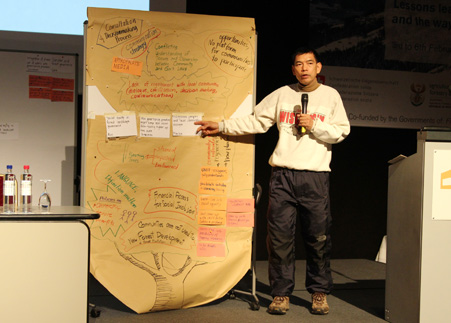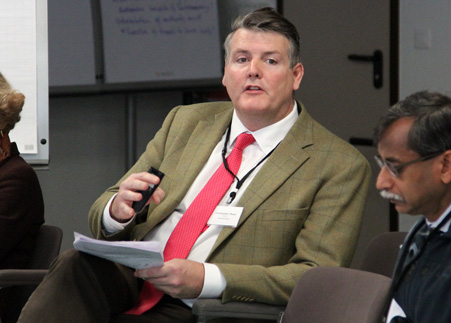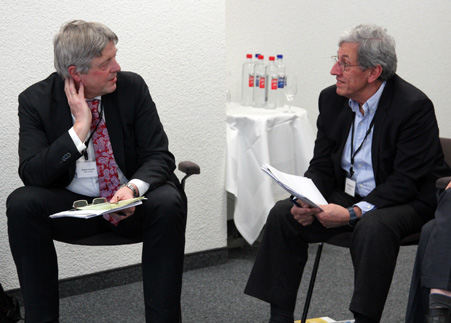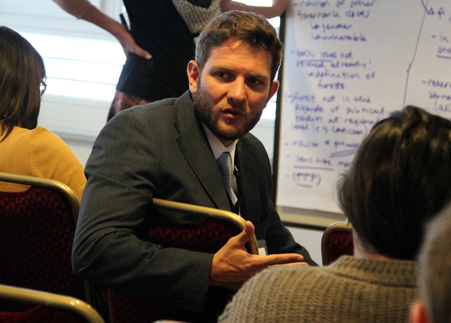|
|
 |
 |
 |
 |
On Friday, plenary met in the morning to hear thematic inputs on the International Model Forest Network, the Forest Legality Alliance, and the XIV World Forestry Congress, to be held in September 2015 in Durban, South Africa. A roundtable discussed the global experience with forest governance monitoring and assessment and ways forward, and held an interactive session with country experts from Indonesia, the Russian Federation and Tanzania. The draft workshop report was then tabled and considered in breakout groups.
The concluding plenary heard an intervention from UNFF11 Bureau Member Vicente Bezerra, Brazil, who provided some considerations on the future of the International Agreement on Forests (IAF). Delegates from the Youth Group then outlined the work undertaken during their parallel conference. They shared their vision, which includes an increased participation of youth in forest governance processes, noting that "the world we live in is not the world youth envisions."
Plenary subsequently addressed the workshop report, focusing on the recommendations directed to UNFF with regard to UNFF11 and the post-2015 IAF. Representatives of the breakout groups, and other participants, shared detailed comments. It was announced that the recommendations will be revised and, following an electronic consultation, they will be finalized by the end of the following week for transmission to UNFF11.
The workshop closed at 5:30pm.
The IISD RS summary of INTERLAKEN+10 is available in English (HTML and PDF) |
|
 |
 |
 |
 |
|
 |
 |
 |
 |
 |
| Ronnakorn Triraganon, The Regional Community Forestry Training Center for Asia and the Pacific |
|
 |
 |
 |
 |
|
 |
 |
 |
 |
On Wednesday, participants held four thematic sessions to address: forest tenure and decentralization; forest landscape governance and green economy; forest governance and biodiversity; and forest governance and safeguards in REDD+ implementation. A brief afternoon plenary heard the main findings of the thematic sessions. Participants then resumed their meetings in five groups working on identifying challenges for forest governance, followed by the World Café, small roundtable discussions on key issues for the future governance of forest landscapes.
The session on forest tenure and decentralization highlighted the need to: recognize the effectiveness of indigenous peoples and local communities to manage their forests sustainably by securing their rights; and change the role of forest agencies in order to ensure support for community rights and management.
The session on forest landscape governance and green economy discussed, among other issues, questions related to managing forests within a green economy; evaluating the spiritual, cultural and aesthetic values of forests and accounting for biodiversity hotspots; reaching out beyond the forest sector; private sector impacts including the role of banks; and monitoring, reporting and assessment methodologies.
The session on forest governance and biodiversity highlighted: the fragmentation of forest-related issues among several international processes and a potential role for UNFF as a platform to address forests in a holistic manner; the importance of securing forest tenure and use rights for indigenous peoples and local communities; and the need to build a strong stakeholder involvement component in the reform process at the national level.
The session on forest governance and safeguards in REDD+ implementation discussed national approaches and challenges related to REDD+ safeguards, lessons on benefit-sharing, and the potential added value of UNFF.
|
|
 |
 |
 |
 |
|
 |
 |
 |
 |
 |
| Chris Buss, International Union for Conservation of Nature (IUCN) |
|
 |
 |
 |
 |
|
 |
 |
 |
 |
On Tuesday, workshop participants heard opening remarks and presentations from a panel of country-led initiatives (CLI) host countries; discussed the findings of the independent assessment of the International Arrangement on Forests and the outcomes of the second meeting of the Ad Hoc Expert Group on the International Arrangement on Forests (AHEG2); and broke into five groups to identify challenges for forest governance.
Josef Hess, Vice-Director, Federal Office for the Environment (FOEN), Switzerland, noted that devolving use and property rights to the lowest level, often the community level, is the basis of the current decentralized governance structure in Switzerland. Dominique Favre, Deputy Head, Global Cooperation Department, Swiss Agency for Development and Cooperation (SDC), stressed the need to recognize all forest values and redefine forest stewardship. Manoel Sobral, Director, UNFF Secretariat, stressed the importance of governance issues, including enforcement and means of implementation, in the review of the IAF and in reaching a strong agreement beyond 2015. Thomas Gass, Assistant Secretary-General, UN Department of Economic and Social Affairs (UN DESA), emphasized that 2015 presents a crucial convergence of opportunities for forests and sustainable development. Christian Küchli, Head of Section, Forest Division, FOEN, presented an overview on the UNFF CLIs on forest governance since 2004, and drew attention to the role of indigenous and local communities as forest custodians. Carol Colfer, Cornell International Institute for Food, Agriculture and Development, presented lessons and recommendations from ten years of global exchange on forest governance through the CLIs. A panel provided an update on past CLIs, including issues raised, recommendations and resulting initiatives.
In the afternoon, Jürgen Blaser, Bern University of Applied Sciences, presented a summary of the findings of the IAF independent assessment; and Charles Barber, World Resources Institute and AHEG2 Co-Chair, and Hossein Moeini-Meybodi, UNFF Secretariat, presented a summary of the outcomes of AHEG2.
|
|
 |
 |
 |
 |
|
 |
 |
 |
 |
 |
| Robert Busink, the Netherlands with Kit Prins, UNECE/FAO |
|
 |
 |
 |
 |
|
|
 |
 |
 |
 |
 |
| Daniel Meireles Tristão, Brazil |
|
 |
 |
 |
 |
|
| Photos from the field trips in Murren and Emmental have been kindly provided by the organizers |
| Funding for coverage of this workshop has been provided by the governments of Finland, Germany, the Netherlands, Norway and Switzerland. |
 |
 |
 |
 |
 |
INTERLAKEN+10 Resources
IISD RS Resources
 IISD RS coverage of the Second meeting of the Open-ended Intergovernmental Ad Hoc Expert Group on the International Arrangement on Forests (AHEG2) for the UN Forum on Forests (UNFF), 12-16 January 2015, UN Headquarters, New York, United States of America IISD RS coverage of the Second meeting of the Open-ended Intergovernmental Ad Hoc Expert Group on the International Arrangement on Forests (AHEG2) for the UN Forum on Forests (UNFF), 12-16 January 2015, UN Headquarters, New York, United States of America
 IISD RS coverage of the Workshop on the International Arrangement on Forests Beyond 2015 - “A Country-Led Initiative in Support of the UN Forum on Forests”, 29-31 October 2014, Beijing, China IISD RS coverage of the Workshop on the International Arrangement on Forests Beyond 2015 - “A Country-Led Initiative in Support of the UN Forum on Forests”, 29-31 October 2014, Beijing, China
 IISD RS coverage of UNFF10, 8-19 April 2013, Istanbul, Turkey IISD RS coverage of UNFF10, 8-19 April 2013, Istanbul, Turkey
 IISD RS coverage of the Workshop on Forest Governance, Decentralization and REDD+ in Latin America and the Caribbean: A Country-led Initiative in Support of the UN Forum on Forests (UNFF), 31 August - 3 September 2010, Oaxaca, Mexico IISD RS coverage of the Workshop on Forest Governance, Decentralization and REDD+ in Latin America and the Caribbean: A Country-led Initiative in Support of the UN Forum on Forests (UNFF), 31 August - 3 September 2010, Oaxaca, Mexico
 IISD RS coverage of the Interlaken Workshop on Decentralization, Federal Systems in Forestry and National Forest Programmes, 27-30 April 2004, Interlaken, Switzerland IISD RS coverage of the Interlaken Workshop on Decentralization, Federal Systems in Forestry and National Forest Programmes, 27-30 April 2004, Interlaken, Switzerland
 Forests-L - A news and announcement list on forest policy issues Forests-L - A news and announcement list on forest policy issues
 Forests Policy & Practice - A Knowledgebase of International Activities Adressing Forests Policy Forests Policy & Practice - A Knowledgebase of International Activities Adressing Forests Policy
 Linkages Update - Bi-weekly International Environment and Sustainable Development News Linkages Update - Bi-weekly International Environment and Sustainable Development News
|
|
 |
 |
 |
 |
|
|
|
|